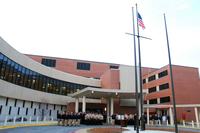 It's starting to happen, finally. After years of giving the Pentagon something close to a blank check to fund wars, buy new arms, and back massive upgrades to U.S. forces, the White House may be saying, at last, "enough."
It's starting to happen, finally. After years of giving the Pentagon something close to a blank check to fund wars, buy new arms, and back massive upgrades to U.S. forces, the White House may be saying, at last, "enough."
According to the Los Angeles Times, President Bush's deputies are asking for tens of billions of dollars in cuts maybe as much as $60 billion over the next six years. "The Air Force and Navy could be hit especially hard, with each branch possibly losing $4 billion to $5 billion in 2006," the paper says.
When he first got into office, Defense Secretary Rumsfeld faced a choice: fund the future, or pay for the past. He could put money into hulking, weapons designed for a punch-out with the Soviet military. Or Rumsfeld could funnel the cash into defense "transformation," to make American forces quicker, better-networked, and more capable (in theory) of fighting the small, nasty battles of the new century.
Then came 9/11. And suddenly, Rummy didn't have to make a choice at all. Questionable Cold War-era programs, like the F/A-22 jet, look on new life. Transformational projects, like the $117 billion "Future Combat Systems" (FCS) initiative, went full steam ahead. Strict spending limits were junked, as America prepared to fight a new series of wars. What was a $310 billion budget in fiscal year 2001 is now slated to grow to $500 billion, or more.
If Iraq had been conquered quickly, Rummy might have been able to duck the choice between the future and the past indefinitely. But the present has gotten in the way. And as the second year of the conflict begins to draw to a close, avoiding decisions in no longer possible. Much of FCS is being rejiggered, to give today's troops technological advantages. Controversial projects like the Virginia-class submarines, Osprey tilt-rotor crafts, and Joint Strategic Fighters are all getting new, harsher looks.
"The Iraqi insurgents have managed to do what Don Rumsfeld in four years has not managed to do, which is bring about cutbacks in a lot of these Cold War-era weapons," the Lexington Institute's Loren Thompson told the Times.
THERE'S MORE: " While the F-22 Raptor is important to the future, it is not something that is needed to fight the Global War on Terrorism," says Military.com columnist H. Thomas Hayden.
PENTAGON BUDGET: DECISION TIME
© Copyright 2024 Military.com. All rights reserved. This article may not be republished, rebroadcast, rewritten or otherwise distributed without written permission. To reprint or license this article or any content from Military.com, please submit your request here.







